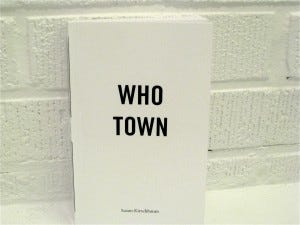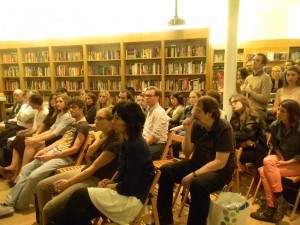news
Diary of A Rogue Writer, Part Two: Getting the good word out
Ph

Photo by Phyllis Leibowitz
(Read part 1 here.)
Through Amazon’s self-publishing arm, Create Space, I self-published Who Town.
I chose Amazon because I felt that as a known brand it would be more likely to generate mass attention for my work. However, I warn other authors with similar aims that it’s not as easy to upload as advertised, or to create a good-looking book. I emailed friends to find someone to set the margins, align my manuscript, and to help me create a cover. Create Space does offer uploading and design services for various fees. Because I could plug into a circle of artist pals with tech savvy, I hired my own graphic collaborator.
From my initial days penning the novel, I had a vision for how I wanted Who Town to appear: stark white cover, bold black letters, compact in size akin to my copy of J.D. Salinger’s Franny and Zooey, and similar to subversive political pamphlets. Since I had been told by mainstream publishers that the story was a bit too edgy for commercial tastes, I wanted to make a statement in a physical sense. So doing it strictly as an e-book never appealed to me. I had cradled books from my earliest days. While I did upload a digital version of Who Town to Amazon (for $7.99, not $0.99) my own Kindle — a gift — remains untouched in its box.
Once Who Town debuted on Amazon, I booked my own reading at the Bowery Poetry Club, where I had read short stories before. I leaked a few excerpts on my website — formerly a journalistic blog, now devoted entirely to fiction. I had a slight advantage as a journalist. A noted event photographer whom I had met in his days as a photo assistant offered to shoot my reading for free. Another pal closed down his restaurant and cooked a six course meal for my family, friends, and some media folks. A colleague who wrote for the New York Times online interviewed me. Another did the same for a European magazine. But beyond this, while I sent copies of Who Town to various editors from the New Yorker to Elle for coverage, not one — including editors for whom I had written/edited articles — reviewed the book.
I still don’t have the guts to ask why, but I’ve assumed it’s because I did it all myself, with no big house to back

me. The one literary website editor I did question told me that he could not review a self published novel “on moral grounds.” Also, I’m an NPR junkie, always listening to interviews with new authors on The Leonard Lopate Show, Studio 360, etc. I sent the novel to several NPR producers. I did get an email from This American Life asking me to pitch myself as a kind of underdog from the Philly suburbs who makes her mark in the Big Apple. But they dropped the ball, stopping all correspondence, although I still send them updates when Who Town gets blurbed in the press. With so many debut novelists hitting NPR’s airways each week, it seems that the self-publishing stigma has blocked me from consideration thus far, despite my New York Times bylines.
To combat this, I’ve taken a grass roots/punk rock approach. I’ve launched a campaign to get my novel not only to editors but also other writers to whom I have been compared — notably Mary Gaitskill and Bret Easton Ellis — as well as film directors, and creative people who love to read and discuss. This creates buzz. (I’d advise every author to start researching contacts now re: the people you’d want to read, including other authors, etc.) I also hit the streets, visiting indie bookstores throughout NYC. Some welcomed me with curiosity, taking five initial books on consignment. One owner said “You’ve got chutzpah!” Another refused to meet me on the grounds that I published my book through Amazon and that Amazon was the enemy of the bookstore. The anti-Amazon bookseller has so far proved the exception. My books do very well in independent stores if placed so that people can see the cover. When displayed on the “new and notable fiction table,” it sold out of McNally Jackson three times. (I have yet to approach the behemoth Barnes & Noble, but I plan to do so this month.)
Right now my home-birthed child, Who Town, is still learning to walk into the world, so I’m not going to weigh in on whether self-publishing has proved to be a success just yet. Clearly, one cannot publish independently without blind passion and faith. I had gotten to a point where I did not want to wait for the establishment to anoint my stories as worthy (or not). While I’d like to start a third novel, my main focus remains the Who Town nursery. I have become a book evangelist. So far the Amazon reviews have proved strong, and I continually encourage those who have read — via Twitter and my website — to submit them.
My advice to self-published authors is this: Get out there. Read for anyone who will listen. Build a website around your work. Make a hit list of people in the know who you think would appreciate your tale and mail them your book with a personal note. And meet your local booksellers. Tell them about your novel, encourage them to review. Remember they are independent and struggling to survive, just as we are. And most importantly, they love a great read. So if you’ve written a quality novel, stand behind it.
***
Read part 1 here.
***
— Susan Kirschbaum lives in downtown Manhattan. Her first novel, Who Town, is now selling at selected New York City bookstores (including McNally Jackson) and on Amazon. She will be speaking on a Self-Publishing Fiction panel on November 1 at Spoonbill & Sugartown at 7:30 pm with Maggie Craig, Nathaniel Kressen, and Rami Shamir.









